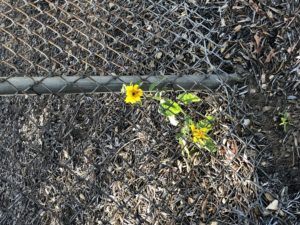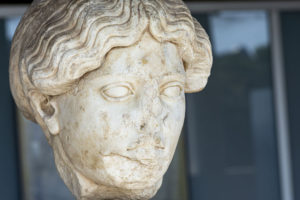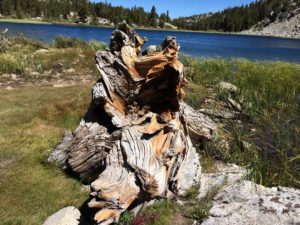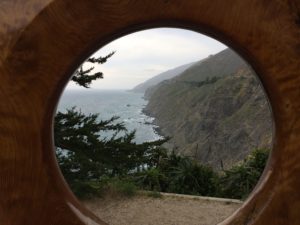Drastic change, and sudden, unexpected loss are exceptionally hard to bear. In shock, we find ourselves unable to comprehend that this thing has happened. That it is irrevocable. Whether it be a death, job loss, lost beloved pet, health condition crisis, financial plunge, or drastic life-style alteration, we stumble about in a fog at first. Unable to access any of the feelings we expect to feel: Sadness, anger, tears, rage, we wander around numbly, closed off, shut down. Dragged under by a rip tide of overwhelm, this state of increasing darkness and numbness becomes our new reality.
 The sudden and violent world-wide onset of the corona virus and our necessary quarantine has made us all feel, in the words of Jungian analyst, professor, and former provost at Pacifica Graduate Institute Pat Katsky, “as though we have been abducted out of our previous life and plunged into this new dark reality.” She likens our plight to the rape and abduction of Persephone to the Underworld by Hades from Greek mythology. In an interview earlier this year the celebrated Jungian analyst and scholar1 Murray Stein replied,
The sudden and violent world-wide onset of the corona virus and our necessary quarantine has made us all feel, in the words of Jungian analyst, professor, and former provost at Pacifica Graduate Institute Pat Katsky, “as though we have been abducted out of our previous life and plunged into this new dark reality.” She likens our plight to the rape and abduction of Persephone to the Underworld by Hades from Greek mythology. In an interview earlier this year the celebrated Jungian analyst and scholar1 Murray Stein replied,
That’s a good metaphor for this sudden, unwanted and unexpected and rather brutal enantiodrama. From innocent maidenhood to the silence of the underworld in such a short period of time—yes, it’s a shock. But we have to remember that Persephone was transformed by this descent into darkness, into the Queen of the Underworld. She adapted. Her eyes had to adjust to the dark in order to function in her new situation.2
Most of the time we think of the Persephone-Demeter myth from the point of view of Demeter, Persephone’s mother and Goddess of Fertility and the Harvest. At first, she laments the unexpected and mysterious disappearance of her daughter. But then, when Demeter discovers that her brother Hades has raped and abducted her, she is so angry that she causes no rain to fall, no crops to grow, the earth becomes withered and barren resulting in the starvation of humans and animals across the globe (sounds like what we might expect from unchecked Climate Change!). At the mercy of the gods, humans lament their plight, entreating Zeus to intervene.
It is human nature to focus on what we have lost.
And to yearn to have it back.
In this time of the corona virus quarantine we have lost a lot. Over 450,000 deaths  worldwide at this writing and more to come. Any sense of normalcy. Jobs. The assumption that we can buy whatever we want at the store when we want it because we are sure it will be available. Basic freedoms, like, shopping at the mall or dining out, going camping, sunbathing at the beach, attending a concert, museum, live theater production – and even though some of these things back are gradually coming back, we may be jeopardizing our health if we dare! We have also lost any assurance that things will return to the old normal. This sudden and invisible predator has stripped us of the confidence we had in knowing how to live our very lives. What the world is experiencing with the corona virus pandemic seems of mythic proportions. And like a myth, it holds the potential to teach us a lesson in humanity.
worldwide at this writing and more to come. Any sense of normalcy. Jobs. The assumption that we can buy whatever we want at the store when we want it because we are sure it will be available. Basic freedoms, like, shopping at the mall or dining out, going camping, sunbathing at the beach, attending a concert, museum, live theater production – and even though some of these things back are gradually coming back, we may be jeopardizing our health if we dare! We have also lost any assurance that things will return to the old normal. This sudden and invisible predator has stripped us of the confidence we had in knowing how to live our very lives. What the world is experiencing with the corona virus pandemic seems of mythic proportions. And like a myth, it holds the potential to teach us a lesson in humanity.
We initially meet Persephone as Kore, which means maiden. Her rape is a brutal, violent act that leaves her forever changed; no longer who she was, no longer a “maiden.” Kore’s extreme wounding creates a pivotal moment, the grounds for an opportunity where her life and her identity take on the possibility of new meaning if she chooses it. She can stay forever a victim of her fate or allow herself to be transformed by it. The myth shows us her choice and her evolution.
Persephone’s abduction into Hades seen from another perspective is an induction into a  realm of Soul that offers a perfect environment to explore the deeper, soul meaning of one’s core, or initial wound3. The challenge, as any of us who have experienced significant upheaval or overwhelming loss know, is getting past the debilitating depression it causes and intense yearning to return to one’s previous life. After a time of grieving, Kore chooses to accept that she will not return to her former life in the Upper World, that is to say, she ceases over-identifying herself with her wound per se, and moves beyond that into understanding its deeper meaning for her soul’s growth when she consumes the six pomegranate seeds. This voluntary consumption of nourishment from her new environment creates the conditions under which her eyes can adjust to her “new normal” in the darkness of the Underworld. In so doing, she acquires her new name Persephone, and in accepting her role as consort to Hades, she claims her identity as Queen and goddess of the Underworld.
realm of Soul that offers a perfect environment to explore the deeper, soul meaning of one’s core, or initial wound3. The challenge, as any of us who have experienced significant upheaval or overwhelming loss know, is getting past the debilitating depression it causes and intense yearning to return to one’s previous life. After a time of grieving, Kore chooses to accept that she will not return to her former life in the Upper World, that is to say, she ceases over-identifying herself with her wound per se, and moves beyond that into understanding its deeper meaning for her soul’s growth when she consumes the six pomegranate seeds. This voluntary consumption of nourishment from her new environment creates the conditions under which her eyes can adjust to her “new normal” in the darkness of the Underworld. In so doing, she acquires her new name Persephone, and in accepting her role as consort to Hades, she claims her identity as Queen and goddess of the Underworld.

Ironically, it is at this very point in the myth that the supplications of Demeter and humans are heard by Zeus and he grants Persephone permission to return to the Upper World with her mother for six months of the year. Demeter’s joy at the return of her daughter, causes crops to grow and fertility to abound on earth. However, the remaining six months she must descend again to the Underworld, one month for every seed she devoured. In other words, despite her reprieve,
she cannot change who she has become as a result of her trauma.
 She is now Persephone, goddess in her own right separate from her mother, and with a separate but related purpose in her own domain. In the darkness of the Underworld, realm of death and decay, important transformations take place: stalks, fallen fruit, leaves, once living matter breaks down into its constituent elements, releasing essential nutrients into the soil where it can provide nurture for roots and seeds. It is here, earth under the care and protection of Queen Persephone, that seeds wait in the cold, dark until their internal circadian clock indicates it is time for them to sprout and grow.
She is now Persephone, goddess in her own right separate from her mother, and with a separate but related purpose in her own domain. In the darkness of the Underworld, realm of death and decay, important transformations take place: stalks, fallen fruit, leaves, once living matter breaks down into its constituent elements, releasing essential nutrients into the soil where it can provide nurture for roots and seeds. It is here, earth under the care and protection of Queen Persephone, that seeds wait in the cold, dark until their internal circadian clock indicates it is time for them to sprout and grow.
This time of enforced inaction is essential to the growing cycle of plants. For humans, too, there is great benefit to be gleaned from time spent separate from our busy lives in contemplation and inner reflection on our values and choices. Whether fueled by depression, or externally imposed as in our current corona virus safer-at-home quarantine, personal sequestering is an opportunity to confront and question on a soul level who we have are in the world vs. who we deeply know ourselves to be on the inside, or even, wish ourselves to become.

Stillness is a gift. Whether because of depression or imposed by circumstances beyond our control, stillness provides the opportunity to listen deeply. To sit and ponder. To sort out what is meaningful from what is no longer essential. To question and confront ourselves on a level we usually do not make time for. Asking ourselves hard questions like: Who am I? What are my core values? What is my purpose? Am I actively living my purpose and my core values? What in my current life is not supporting that purpose or those values? It may require a conscious severing and shedding of old behaviors, relationships, and priorities in order to nurture and tend the growth of this deeper, soul-based purpose and identity. Persephone must accept the death of her maiden self in order to become her soul-based Self. She acknowledges and integrates her woundedness. And, in embracing the limitations of the dark world she now inhabits, she discovers not only an expansion of Self but a new understanding of her greater purpose as the goddess of Death, transformation, and birth of new life
priorities in order to nurture and tend the growth of this deeper, soul-based purpose and identity. Persephone must accept the death of her maiden self in order to become her soul-based Self. She acknowledges and integrates her woundedness. And, in embracing the limitations of the dark world she now inhabits, she discovers not only an expansion of Self but a new understanding of her greater purpose as the goddess of Death, transformation, and birth of new life
which she does not abandon
when she has the opportunity to return to her old life.
On a Collective level, the corona virus has provided all of us with an enforced but also, voluntary sequestering opportunity. Whether we have taken advantage to ask ourselves the deep questions or not, horrific current events have erupted violently into our awareness, causing masses of individuals around the world to rise up and protest what they recognize does not correspond to their core values. The peaceful demonstrations protesting a culture of police brutality and lack of respect for Black Lives includes blacks, whites and people of all colors, races, creeds, and gender orientations, families, new parents with babies strapped to their chests, young singles, and seniors, all willing to brave confrontation by armed “peace enforcers” with tear-gas, pepper spray, rubber bullets, and even more importantly, a willingness to risk infection by the potentially deadly corona virus to make their voices heard that Black Lives Matter.

I will defer to the experts to answer why? why now? And why all of these diverse people are rising to endanger their lives to demonstrate for days at the injustice of one black man’s death at the knee of a ruthless cop in Minneapolis when so many others have died senselessly, needlessly before him? However, I will suggest that the unusual opportunity of enforced inactivity, coupled with our witnessing of the cruel and merciless killing of a peaceful and compliant black man who we watched die face down in the street, calling out for his mother and repeating over and over that he could not breathe has unleashed a rage that was deeply buried and now needs to be acknowledged as a toxic inequity in the foundational soil of our American culture. This rage needs to be witnessed. It needs to be aired in public. It needs to be sorted through and sorted out such that the very institutional foundations of our society can be reconfigured from the bottom up. According to the values of the American Constitution and inclusive of all Americans regardless of the color of their skin, or their religion, or their immigration status.
We are living in unprecedented times. Mythic times. We have a choice: yearn to return to the fantasy of the “old normal” or, see our current situation an opportunity to transform the darkness that wounds humanity by our inhumanity to others. We can learn to accept this deadly virus as a part of our universe and learn how to accommodate ourselves to overcome it using knowledge and science. And, we have an opportunity to transform the undercurrent of seething rage at injustice and cruel hypocrisy into positive action for change. We must understand our wounds and honestly accept them as a part of who we are in order to transform them. We must accept that there are limitations to our process: we need to act within the law. We need to rebuild old structures and institutions without resorting to chaos and anarchy. We need to have patience. It will take time. And thought. And compassion. And witnessing of the pain and suffering the collective, historical, generational wounds have caused. And it will take listening. Deep, deep listening. And it will take asking ourselves who are we as Americans? What is our purpose? What are our values? How can we change our current institutions to support those values? How will we take advantage of this time of corona virus, of stillness, and safer at home to connect with and grow the Soul of America?

 (626) 755-6437
(626) 755-6437
